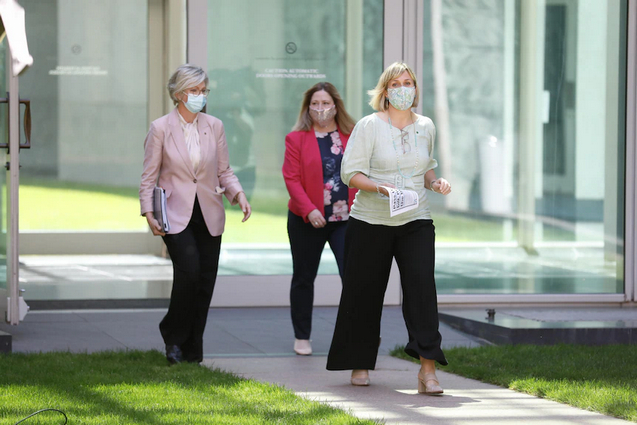Global heating and conflict are fundamentally linked. Without peace, there will be no climate action
If global heating exacerbates conflict, conflict also exacerbates heating, in a dialectic that fundamentally links decarbonisation to the struggle for peace.
Climate change works as a crisis multiplier. As the global thermometer climbs, you get more refugees, more inequality and more political instability, with high temperatures and natural disasters widening every social fissure.
Not surprisingly, multiple studies warn that, on a hothouse planet, extreme conditions intensify existing tensions, making more likely civil wars, military incursions and even genocides.
But that process goes both ways.
Last year, the International Committee of the Red Cross (ICRC) published a report that documented how war-torn nations suffer disproportionately from climate variability. As you may expect, conflict makes responding to global warming more difficult, as people and institutions grappling with war lack the capability to simultaneously address environmental disaster.
Symptomatically, the majority of those nations yet to ratify the Paris agreement are countries that are either embroiled in conflict or have recently emerged from one.
The ICRC report drew on experiences in southern Iraq, northern Mali and Central African Republic.
Wealthy countries should not, however, think themselves immune.
If, for instance, the tension over Taiwan escalated significantly, climate change would almost instantly vanish from the front pages. As they prepared for armed confrontation, neither Joe Biden nor Xi Jinping would be talking about global warming.
It’s not just a question of getting distracted. It’s also that preparations for war directly undermine climate action, with modern militaries reliant on enormous quantities of fossil fuel.
In their book The Shock of the Anthropocene, Christophe Bonneuil and Jean-Baptiste Fressoz note that a single B-52 bomber burns 12,000 litres of jet fuel an hour while an F-15 fighter goes through 7,000 litres, figures “comparable to the consumption of an average family car in a whole decade”.
Not surprisingly, one recent academic study described the US defence forces as “one of the largest polluters in history, consuming more liquid fuels and emitting more climate-changing gases than most medium-sized countries”.
In 2017 alone, the US military bought an astonishing 269,230 barrels of oil a day, producing more than 25,000 kilotonnes of carbon dioxide through their use.
In periods of geopolitical tension, such dizzying figures climb higher, as rival power blocs invest in more equipment and deploy it more often. Bonneuil and Fressoz estimate that between 10 and 15% of American emissions during the cold war could be attributed to the military.
That’s because war – and the prospect of war – normalises environmentally destructive practices unthinkable in other contexts.
Think of Vietnam and how the US forces deliberately sprayed some 70m litres of herbicide on forests, in an effort to destroy the cover that the North Vietnamese relied upon.
Think of the first Gulf War and the use of depleted uranium in about 340 tonnes of missiles launched into Iraq.
Today, China possesses up to 350 nuclear weapons. The US has perhaps 5,800. The deployment of any of them would take the global environmental crisis into new realms of horror.
As we approach Cop26, we should remember that most of the carbon ever generated by humanity was released after the Kyoto summit, a conference at which the world’s politicians solemnly pledged that emissions would be cut.
On Monday, at a Liberal party room meeting, Morrison reportedly linked his new enthusiasm for climate pledges to the Aukus military pact, almost as if an Australian commitment to net zero by 2050 were a quid pro quo for the nuclear submarine deal with the US.
In other words, it appears that carbon targets are seen as facilitating an increased militarisation.
It’s hard to overstate just how dangerous this is.
Whatever the politicians say, no one will decarbonise during a new cold war. An arms race in the Pacific therefore threatens any progress that might emerge from the Glasgow talks. The response to global warming requires international action – and that’s impossible should China and the US prepare for war.
Without peace, there’ll be no climate action – and without climate action, there’ll be no security for Australia or any other nation.
Links
- Is Climate Change Causing More Wars?
- How does war contribute to climate change?
- The Shock of the Anthropocene review – a crisis centuries in the making
- Hidden carbon costs of the “everywhere war”: Logistics, geopolitical ecology, and the carbon boot-print of the US military
- Nuclear power is too costly, too slow, so it’s zero use to Australia’
- We need to get real about carbon offsets in Australia – they won’t stop climate changes emissions plan
- When rain turns to dust
- US military is a bigger polluter than as many as 140 countries – shrinking this war machine is a must
- If the US could get on a war footing in 1941, we can tackle the climate emergency
- The Nationals’ climate position has become symbolic posturing and no longer represents Australian farmers
- The Guardian view on the net zero strategy: not tough enough













